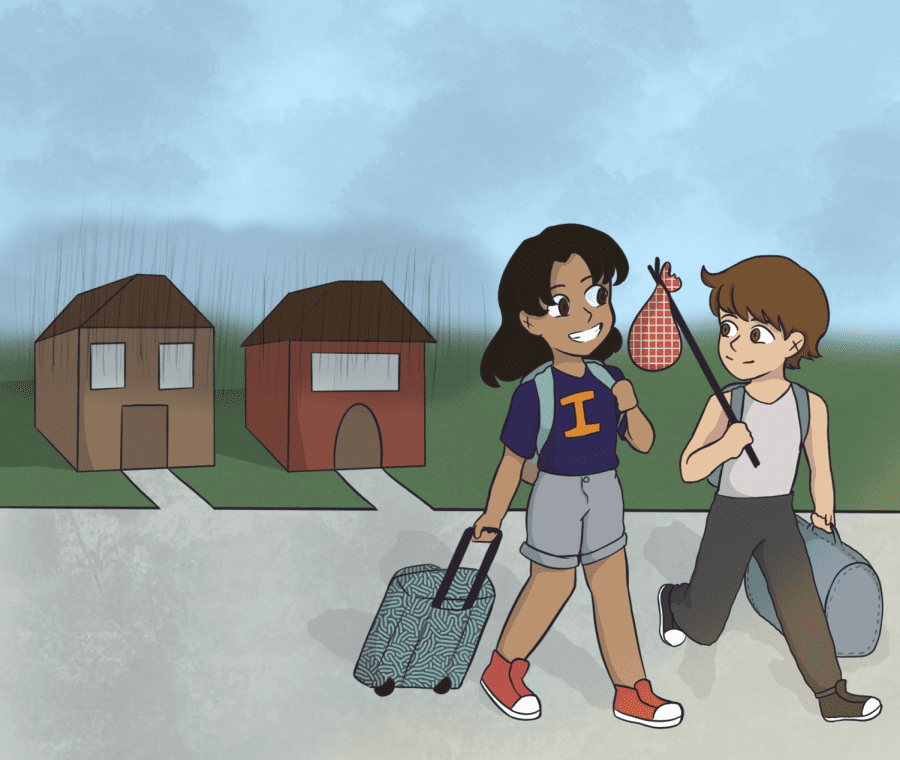Students experience new life away from home
Sep 28, 2022
Caleigh Ellis, freshman in Education, first moved onto campus a month ago. Unlike many students who were sad about leaving home for college, Ellis said she had been waiting for this moment for so long and was “incredibly relieved.”
Growing up under heavy family pressure, Ellis said she always expected to go to college and looked at it as an escape from her depressing life back then.
“Being out here is one of the best things that’s happened to me in such a long time,” Ellis said. “It helps me not feel like being back home (which) makes me feel suffocated in a way.”
Carrie Finkill, the embedded counselor in residential life, said students trying to move forward from traumatic childhoods and dysfunctional homes are usually underrepresented. Finkill said that as these students attend college and leave their nuclear culture, they start to evolve their old worldviews and gain more autonomy.
“Your world gets a whole lot bigger because you’re exposed to so many different things as a student in college,” Finkill said. “So all of a sudden, all these things are opening up, and all these ideas that seemed very solid one way begin to change.”
Get The Daily Illini in your inbox!
Before college, Ellis was living with a foster family, where she had to share a room with two others. Ellis said some extended family members didn’t like her and her friends that stayed. She recalled one day coming home from a friend’s birthday and seeing the room full of trash, the closet ransacked and her things thrown everywhere.
Now living in her dorm, Ellis said it is great to have a place to herself where no one can step in without her permission.
Ellis said she feels at peace when doing housework that reminds her she owns the space, whether it’s putting up clothes, running an essential oil diffuser or decorating the room with posters and tapestries. Ellis said an organizational structure helps with her mental health and recommends students keep a relaxing routine.
Micheala Burrows, senior in LAS, echoed Ellis’ experience. Burrows said she almost never left the small area she was brought up in. She went to a small, Christian high school with a graduating class of 20 students, lived three miles outside town in the woods with no car to travel away and stayed at the same address for 18 years.
With an unsafe, traumatic family life, Burrows said her home “sucked the life out” of her, and she knew she needed to move away when going to college.
“I needed to get out because I didn’t feel safe, I didn’t feel happy and I didn’t feel like I was meant to be there,” Burrows said. “I didn’t realize until I really went away from my town that it was really ignorant and very blinding.”
When moving to the University, Burrows saw numerous opportunities the campus town had to offer, such as jobs, scholarships and student loans. She learned to gather life resources and pay bills alone and was amazed by the environment with countless restaurants, study spaces, social clubs and unlimited WiFi access, which Burrows didn’t have back in her hometown.
“These might be basic things, but especially for someone coming from a really small location, having all these things suddenly at my disposal was really life-changing,” Burrows said.
Burrows said she loves the vast diversity on campus. Surrounded by people from around the world, she enjoys learning about different cultures and backgrounds, which she didn’t have a chance to do in a rural area.
“That’s something that’s very, very important for me as a humanities major — I love talking to people about how they observed the world,” Burrows said. “This (campus) is like a tight-knit community that I don’t think I’ll ever quite forget.”
However, Finkill said the sudden exposure can result in anxiety in students first coming into the University, especially for those who have no one to help prepare them in a dysfunctional home.
Burrows said she experienced that anxiety in her freshman year when she had to navigate the campus alone and taught herself everything others learned from their parents. However, she said she soon used that fear to push herself to embrace who she was.
“That grueling process of change is really overwhelming, but at the end of it, you come up so much better,” Burrows said. “Being anxious is normal, and it’s worth it.”
Burrows said it is hard for new students to find their place on campus. She encouraged students to embrace the discomfort, reach out to people and explore the campus instead of sitting in a chair thinking about how lonely they are.
Finkill said University Housing constantly provides mental health services to students, including regular gatherings with well-trained residential advisors, guest talks on conflict resolution and Finkill herself as an on-site counselor at ISR — where she closely supports student residents.
“I do think housing does a good job of offering the information,” Finkill said. “The other part of it, of course, is you have to take the information. Everything is a two-way street.”






